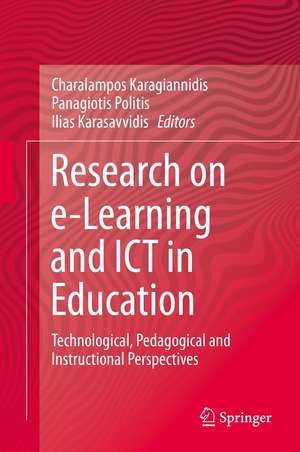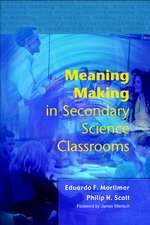Research on e-Learning and ICT in Education: Technological, Pedagogical and Instructional Perspectives
Editat de Charalampos Karagiannidis, Panagiotis Politis, Ilias Karasavvidisen Limba Engleză Hardback – 8 aug 2014
The volume encompasses the current trends and issues which determine and inform the integration of ICT in educational practice, including educational software, educational games, collaborative learning, virtual learning environments, social networks, learning analytics, digital museums, as well as the evolution of e-learning.
| Toate formatele și edițiile | Preț | Express |
|---|---|---|
| Paperback (1) | 390.46 lei 6-8 săpt. | |
| Springer – 17 sep 2016 | 390.46 lei 6-8 săpt. | |
| Hardback (1) | 397.97 lei 6-8 săpt. | |
| Springer – 8 aug 2014 | 397.97 lei 6-8 săpt. |
Preț: 397.97 lei
Nou
Puncte Express: 597
Preț estimativ în valută:
76.15€ • 79.72$ • 63.01£
76.15€ • 79.72$ • 63.01£
Carte tipărită la comandă
Livrare economică 07-21 aprilie
Preluare comenzi: 021 569.72.76
Specificații
ISBN-13: 9781461465003
ISBN-10: 1461465001
Pagini: 314
Ilustrații: XXI, 314 p. 61 illus., 48 illus. in color.
Dimensiuni: 155 x 235 x 25 mm
Greutate: 0.65 kg
Ediția:2014
Editura: Springer
Colecția Springer
Locul publicării:New York, NY, United States
ISBN-10: 1461465001
Pagini: 314
Ilustrații: XXI, 314 p. 61 illus., 48 illus. in color.
Dimensiuni: 155 x 235 x 25 mm
Greutate: 0.65 kg
Ediția:2014
Editura: Springer
Colecția Springer
Locul publicării:New York, NY, United States
Public țintă
ResearchCuprins
Section 1 Situating ICT in Education.- 1.Digital Technology - an Effective Educational Change Agent?.- 2.The Evolution of Educational Technology based on a Bibliometric study.- 3.Theories of Learning in Math and Science Educational Software.- Section 2 ICT in Preschool and Primary Education. 4.Educational software use in kindergarten.- 5.Geometry teaching through ICT in primary school.- 6.Teaching Informatics in Primary School with and without educational software support.- Section 3 ICT and Teaching Programming.- 7.Educational Games for Teaching Computer Programming.-
8.Robotics and Programming Concepts in Early Childhood Education.- Section 4 Web2.0 Tools and Learning.- 9.Integrating Blogs in Primary Education.-10.Effectiveness of Wiki-based Learning in higher education.- 11.Courseware Evaluation through Content, Usage and Marking Assessment.- Section 5 ICT for Learning in Museums.- 12.Game design based Learning in Cultural Institutions.- 13.Digital applications in museums: an analysis from a museum education perspective.- Section 6 ICT and Pre- and In-service Teacher Practices.- 14.Technology integration in the most favorable conditions: findings from a Professional Development Training Programme.- 15.ICT Use in Secondary Education - Schooling Necessities and Needs for Human Resources.- 16.Teacher Preparation for Educational Technology.- Section 7 – ICT for Specialized Uses.- 17.Conversational Agents for Learning: How the Agent Role Affects Student Dialogue.- 18.Anxiety Awareness in Education: A Prototype Bio-Feedback Device.- 19.Structured Learning through Digital Storytelling for Children with Autism.
8.Robotics and Programming Concepts in Early Childhood Education.- Section 4 Web2.0 Tools and Learning.- 9.Integrating Blogs in Primary Education.-10.Effectiveness of Wiki-based Learning in higher education.- 11.Courseware Evaluation through Content, Usage and Marking Assessment.- Section 5 ICT for Learning in Museums.- 12.Game design based Learning in Cultural Institutions.- 13.Digital applications in museums: an analysis from a museum education perspective.- Section 6 ICT and Pre- and In-service Teacher Practices.- 14.Technology integration in the most favorable conditions: findings from a Professional Development Training Programme.- 15.ICT Use in Secondary Education - Schooling Necessities and Needs for Human Resources.- 16.Teacher Preparation for Educational Technology.- Section 7 – ICT for Specialized Uses.- 17.Conversational Agents for Learning: How the Agent Role Affects Student Dialogue.- 18.Anxiety Awareness in Education: A Prototype Bio-Feedback Device.- 19.Structured Learning through Digital Storytelling for Children with Autism.
Recenzii
From the book reviews:
“This book is another professional entry from Springer. It is well organized and carefully edited. … I recommend that several copies be purchased by each university that has education and/or instructional design programs, and put on library reserve for courses at all levels that address ICT. The book is a valuable resource to include in course bibliographies.” (G. Abramson, Computing Reviews, February, 2015)
“This book is another professional entry from Springer. It is well organized and carefully edited. … I recommend that several copies be purchased by each university that has education and/or instructional design programs, and put on library reserve for courses at all levels that address ICT. The book is a valuable resource to include in course bibliographies.” (G. Abramson, Computing Reviews, February, 2015)
Notă biografică
Dr. Charalampos Karagiannidis is an Associate Professor of ICT Applications in Learning and Special Education at the Department of Special Education of the University of Thessaly, Volos, Greece, since September 2005. Dr. Panagiotis Politis is an Assistant Professor of ICT in Education, Department of Primary Education, University of Thessaly, Volos, Greece. He holds a BSc in Physics from the University of Patras, Greece, and a MSc and a PhD, both in Didactics of Informatics, from the University Paris 7, France. He specialises in the area of ICT in Education, Educational Software Development and Didactics of ICT. His research interests include ICT in Education, Modelling Software Design, pedagogical software evaluation and E-learning. Dr. Ilias Karasavvidis is Assistant Professor on ICT and Learning in the Department of Preschool Education at the University of Thessaly, Greece. He is the head of the ICT Research Unit of the Natural Sciences and Technologies Lab in the same Department.
Textul de pe ultima copertă
An essential text for researchers and academics seeking the most comprehensive and up-to-date coverage of all aspects of e-learning and ICT in education, this book is a multidisciplinary forum covering technical, pedagogical, organizational, instructional and policy aspects of the topic. Representing the best peer-reviewed papers from the 8th Panhellenic Conference on ICT in Education, special emphasis is given to applied research relevant to educational practice and guided by the educational realities in schools, colleges, universities and informal learning organizations.
The volume encompasses the current trends and issues which determine and inform the integration of ICT in educational practice, including educational software, educational games, collaborative learning, virtual learning environments, social networks, learning analytics, digital museums, as well as the evolution of e-learning.
The volume encompasses the current trends and issues which determine and inform the integration of ICT in educational practice, including educational software, educational games, collaborative learning, virtual learning environments, social networks, learning analytics, digital museums, as well as the evolution of e-learning.
Caracteristici
Includes original research on cutting edge e-Learning technologies Addresses both theoretical and technical aspects of e-Learning? Includes invited articles from the 8th Pan-Hellenic Conference on ICT in Education (HCICTE 2012) Includes supplementary material: sn.pub/extras










